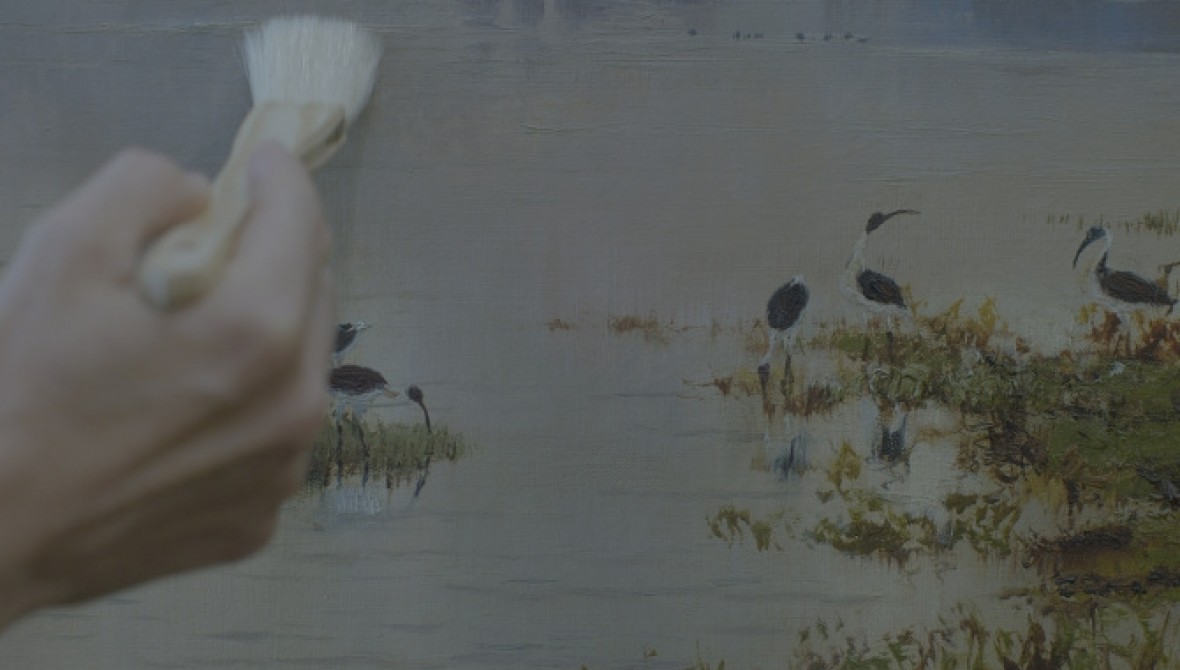Gabriella Hirst
How to Make a Bomb and Ecological Thinking Visiting Artist Read more
Thu 17 November 2022, 3:30pm - 5:00pm at Object Based Learning Lab, UCL

(Photo credit: Still from Gabriella Hirst's Darling Darling)
Gabriella Hirst's film Darling, Darling (2021) consists of footage of the devastated land and waterways of the Darling River Basin in modern-day Australia (known as the ‘Barka’ as it is known by the Traditional Owners of the region), filmed to emulate 18-19th century European landscape painting compositions. This is contrasted with documentation of the meticulous restoration of a prized colonial painting of the same region held in the Art Gallery of New South Wales.
Following a screening of the film, a discussion with art historian Pandora Syperek of Loughborough University London will position the film in relation to notions of leakiness as a response to architectures of containment. In the process it will think through ideas such as hydro-institutional critique, landscape painting and settler colonialism, and scrutinize processes of care.
This event is programmed in collaboration with the Slade Material Research Project. Darling, Darling was commissioned by ACMI/Ian Potter Foundation in 2020
The venue has step-free access. If you have other access requirements, please let us know via the booking form or by emailing Laura Purseglove (l.purseglove@lboro.ac.uk).
If you are attending in person you are free to turn up, but we recommend booking so we can send you information on the event.
Please click here to book your in person ticket (via Eventbrite)
If you just wish to join online, please book via the link below so we can send you the streaming link.
Please click here to book your online ticket (via Eventbrite)
There is no charge for this event.
Gabriella Hirst is an artist working with Radar to begin a new, long-term research project exploring what she is calling 'hydro-institutional critique'. She was born and grew up in Australia on Cammeraygal land and is currently living between Berlin and London. She works primarily with moving image, performance, and with the garden as a site of critique and care. Gabriella's practice explores notions of capture, most recently in relation to museums, gardens and irrigation. She maintains an ongoing research/garden project with curator Warren Harper navigating the entanglements of nuclear armament and colonial gardening practices. Recent projects have been exhibited and commissioned by the Kunsthalle Osnabrück (DE), Focal Point Gallery (UK), The Art Gallery of New South Wales and the Australian Center for the Moving Image (AU). She is the recipient of the 2020 ACMI/Ian Potter Moving Image Commission, is a previous Marten Bequest Scholar and a recipient of the John Crampton Fellowship. Gabriella is associate lecturer in Media Studies with the RCA School of Architecture. An 'Atom bomb' rose cultivated by Hirst and Harper has been planted at Loughborough University as part of their ongoing project How to Make a Bomb.
Pandora Syperek is Leverhulme Early Career Fellow at the Institute for Design Innovation, Loughborough University London, and Visiting Fellow at the V&A Research Institute. Her research examines the intersections of science, gender and the nonhuman within modern and contemporary art and cultures of display. She has published numerous book chapters and journal articles and is co-editor of Oceans (Whitechapel Gallery/MIT Press, forthcoming 2023) and a special issue of the Journal of Curatorial Studies on ‘Curating the Sea’ (2020), both with Sarah Wade. From 2016-2017 Pandora was postdoctoral fellow at the Paul Mellon Centre for Studies in British Art, and she holds a PhD in the History of Art from University College London.
How to Make a Bomb and Ecological Thinking Visiting Artist Read more
A programme of artist commissions and events exploring what creative and collaborative methodologies can bring to ecological study. Read more